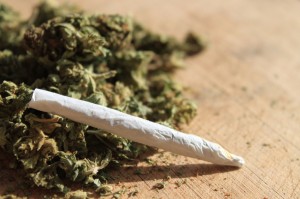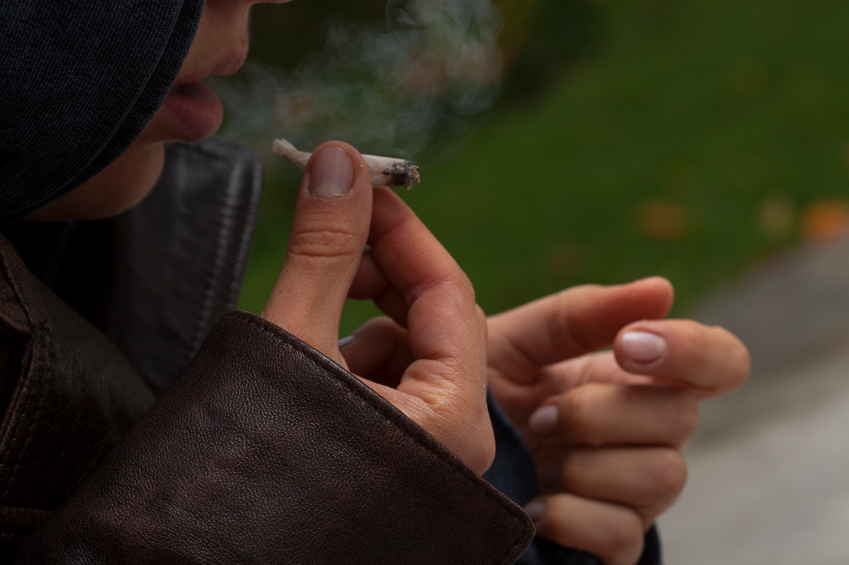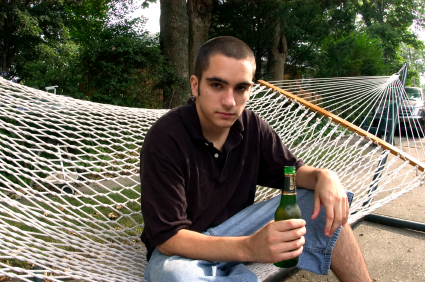Continuing Marijuana Use After a First Episode of Psychosis Increases Risk of Relapse
 A 2016 article in the journal JAMA Psychiatry reports that continuing to use cannabis after a first episode of psychosis increases risk of relapse. The study by Sagnik Bhattacharyya and colleagues employed longitudinal modeling to determine the role of cannabis use in psychotic relapse. The researchers followed 90 women and 130 men for two years after a first episode of psychosis, and found that the more marijuana they used, the more likely they were to have a relapse of psychosis.
A 2016 article in the journal JAMA Psychiatry reports that continuing to use cannabis after a first episode of psychosis increases risk of relapse. The study by Sagnik Bhattacharyya and colleagues employed longitudinal modeling to determine the role of cannabis use in psychotic relapse. The researchers followed 90 women and 130 men for two years after a first episode of psychosis, and found that the more marijuana they used, the more likely they were to have a relapse of psychosis.
Relapse rates were highest (59.1%) for participants who used pot continuously following their first episode of psychosis. Relapse rates were lower (36.0%) for those who used cannabis intermittently thereafter, and lowest (28.5%) among those who discontinued cannabis use after their first episode of psychosis.
A statistical test known as a cross-lagged analysis was used to establish that cannabis use affected later relapse, rather than relapse of psychosis leading to further cannabis use.
Another statistical strategy using fixed-effect models revealed that risk of psychotic relapse was 13% higher during times of cannabis use than during periods of no cannabis use.
These findings offer some hope that the likelihood of psychosis relapse can be reduced, since ongoing cannabis use is a risk factor that can be modified, unlike family history or genetics. Bhattacharyya and colleagues called for research into interventions that can help discourage cannabis use in people who have had a first episode of psychosis.
Editor’s Note: N-acetylcysteine, a nutritional supplement sold in health food stores, can reduce cannabis use compared to placebo in teen users.
Link Between Childhood Trauma and Difficult Course of Bipolar Disorder Clarified
A collaboration between Norwegian and French researchers led by Bruno Etain has clarified the pathway by which childhood trauma is linked to worse outcomes among people with bipolar disorder. The researchers, who presented their work in a poster at the 2015 meeting of the Society of Biological Psychiatry, replicated earlier findings by this editor (Robert Post) that patients who experienced trauma as a child had a more adverse course of bipolar disorder. Etain and colleagues found a link between childhood trauma and an earlier age of onset of bipolar disorder, rapid cycling, suicide attempts, and cannabis misuse.
The researchers identified more than 550 patients with bipolar disorder, who answered questionnaires about their history of bipolar disorder and childhood trauma. Their DNA was also analyzed, and the researchers found that the effect of childhood trauma on age of onset was mediated by the presence of common genetic variants in proteins related to stress (the serotonin transporter) and immune function (Toll-like receptors). They also found that the traits of mood lability (or moodiness) and impulsivity mediated the effects of trauma on clinical outcomes.
The lasting epigenetic effects of child maltreatment and adversity noted in the above abstract are consistent with a large literature showing more epigenetic effects in these individuals than in controls. While genetics are important, the impact of the environment is also substantial.
Halting Marijuana Use Might Improve Memory
Researcher Amanda Roten reported at the 2014 meeting of the American Academy of Child and Adolescent Psychiatry that adolescents who stopped heavy marijuana use showed improvements in multiple areas of learning and memory. These data support previous findings that pot can cause impairments in cognitive functioning, but that abstaining from the drug can bring about improvement relative quickly.
These data contrast with some others. A 2009 study by J. Jacobus et al. in the journal Pharmacology Biochemistry and Behavior suggested that some changes in brain structure resulting from marijuana use, such as decreases in cortical volume, can persist for one to three months following abstinence.
Madeline Meier, another researcher at the meeting, reported that 1,037 participants who used marijuana persistently from about age 13 to age 38 lost an average of 8 IQ points. Controlling for years of education and other potential confounds such as alcohol and drug use did not affect these findings. Moreover, Meier found that “cessation of cannabis use did not fully restore IQ among adolescent-onset cannabis users.”
Editor’s Note: The popular view that marijuana is a benign substance overlooks some key facts. The main pharmacological effect of pot is an amotivational syndrome, causing apathy and lack of drive to participate in work, study, and other activities. Heavy use of pot doubles the risk of psychosis, and this risk is further increased if a user has a common genetic variation in the enzyme catechol-o-methlyl transferase (COMT), which metabolizes dopamine. The more efficient allele of COMT (known as val-56-val, identifying two valine amino acids) lowers frontal cortex dopamine more, and increases the risk of delusions and hallucinations. Marijuana alters brain structure and impairs memory. It may now be legal in some states, and while reducing penalties for smoking marijuana may be a good idea, this does not mean the drug is a harmless substance.
The moral of the story is that avoiding marijuana use in the first place, especially for people with bipolar disorder, should make it easier to get well and stay well. For current marijuana users, N-acetylcysteine (NAC, a nutritional supplement available without a prescription from health food stores) has been shown to help adolescents decrease marijuana use more than placebo.
A Paradigm for Treatment of Severe PTSD developed by Dr. David Bakish
In an earlier BNN we mistakenly attributed the protocol developed by David Bakish, a renowned Canadian psychopharmacologist, to another doctor named Vaishali P. Bakshi. Our apologies to both individuals.
Dr. David Bakish is Medical Director at the Ottawa Psychopharmacology Clinic and a Former Professor of Psychiatry at the University of Ottawa in Ottawa, Ontario. He shared with this editor his novel treatment strategy for patients with exceptionally profound degrees of post-traumatic stress disorder (PTSD), which, particularly among military veterans, can be compounded by traumatic brain injury. He has had a distinguished academic career with an extensive CV and credentials including membership in the International College of Neuropsychopharmacology (CINP), the Royal College of Physicians and Surgeons of Canada, and the Canadian and European Colleges of Neuropsychopharmacology. Most importantly he has had great success in treating large numbers of patients with severe PTSD. Treatment options based on placebo-controlled clinical trials are sometimes insufficient for the treatment of seriously ill patients. FDA-approved treatment for PTSD consists of serotonin-selective antidepressants, while exposure therapies (in which the patient is gradually exposed to more of the stimuli that triggered symptoms) are the recommended psychotherapy, but these methods often leave patients highly disabled. We relay Dr. Bakish’s treatment strategy with several caveats.
Most of Bakish’s suggestions are “off-label” treatments for the treatment of PTSD or traumatic brain injury, i.e. treatments that are not FDA-approved for these purposes. In some of these instances, there is no controlled research to support the use of these drugs in patients with PTSD. Thus the ideas noted here are anecdotal, based on his personal experience, and have not been tested in controlled clinical trials. Accordingly, patients with their physicians must make their own decisions about any of the strategies reported in this or other issues of the BNN.
Bakish’s typical treatment algorithm goes well beyond the usual treatment guidelines to find solutions for hard-to-treat patients. Bakish first addresses sleep disturbance, which is almost universal in PTSD. He suggests the anticonvulsant levetiracetam (Keppra), for the hyperarousal and sleep disorder. He uses starting at doses of 125mg per night and increases by 125mg every three weeks. Read more
Marijuana Addiction Associated with White Matter Loss and Brain Changes in Healthy People and Those with Schizophrenia
It has been established that cannabis use is associated with impairments in working memory, but researchers are still investigating how these impairments come about. A 2013 study by Matthew J. Smith et al. in the journal Schizophrenia Bulletin compared regular marijuana users both with and without schizophrenia with demographically similar people who did not use marijuana.
Using magnetic resonance imaging (MRI), the researchers were able to map each participant’s brain structures. Healthy people who were marijuana users showed deficits in white matter (axons of neurons that are wrapped in myelin) compared to healthy people who did not use the drug. Similarly, patients with schizophrenia who used marijuana regularly had less white matter than those patients with schizophrenia who did not use the drug. There were also differences in the shapes of brain structures, including the striatum, the globus pallidus, and the thalamus, between cannabis users and non-users.
Differences in the thalamus and striatum were linked to white matter deficits and to younger age of cannabis use disorder onset.
Differences between cannabis users and non-users were more dramatic across the populations with schizophrenia than across the healthy populations.
Editors note: Future research is needed to determine whether marijuana causes these brain changes, or whether the brain changes are a biomarker that shows a vulnerability to marijuana addiction (although the latter is less likely than the former).
Other data show that marijuana is associated with an increase in psychosis (with heavy use), cognitive deficits, and an earlier onset of both bipolar disorder and schizophrenia in users compared to non-users. These findings make pot begin to look like a real health hazard. With legalization of marijuana occurring in many states, ease of access will increase, possibly accompanied by more heavy use. The most consistent pharmacological effect of marijuana is to produce an amotivational syndrome, characterized by apathy or lack of interest in social activities. Particularly for those already struggling with depression, pot is not as benign a substance as it is often thought to be.
Adolescent Brain Particularly Susceptible to Decline in IQ from Marijuana Use
 A decades-long study in New Zealand suggests that people who use marijuana persistently during adolescence lose 8 IQ points by adulthood compared to their peers who never use marijuana. Quitting or reducing cannabis use after adolescence did not restore the intellectual abilities in those who used it persistently in their youth. This is the first study of its kind that controlled for differences in functioning that existed before adolescence.
A decades-long study in New Zealand suggests that people who use marijuana persistently during adolescence lose 8 IQ points by adulthood compared to their peers who never use marijuana. Quitting or reducing cannabis use after adolescence did not restore the intellectual abilities in those who used it persistently in their youth. This is the first study of its kind that controlled for differences in functioning that existed before adolescence.
Participants took part in neuropsychological testing at the age of 13, prior to any cannabis use, and then were periodically interviewed about their use of the drug (at the ages of 18, 21, 26, 32, and 38). At age 38 they underwent IQ testing again.
Although persistent cannabis users tended to have fewer years of education, the lack of education was not responsible for the difference in adult IQ.
Those participants who only began using cannabis persistently in adulthood did not see a decline in IQ, suggesting that the adolescent brain is particularly susceptible to damage from cannabis use.
Bipolar Disorder and Its Comorbidities in Youth
A symposium on bipolar disorder and its comorbidities in children and adolescents was held at the annual meeting of the American Academy of Child and Adolescent Psychiatry in 2011. The following findings were reported there.
ADHD
Researcher Janet Wozniak discussed the relationship of bipolar illness and attention deficit hyperactivity disorder (ADHD). Based on interviews of family members of children with bipolar illness alone, bipolar illness plus ADHD, ADHD alone, and controls, she concluded that bipolar illness occurred more often in families of children with bipolar illness with or without ADHD. Similarly, she showed that there was more ADHD in relatives of children with either ADHD alone or ADHD comorbid with bipolar illness. She concluded that the comorbidity of bipolar illness and ADHD is a unique subtype of bipolar disorder and requires further study.
Emotional Dysregulation and Substance Abuse
In another presentation, Tim Wilens indicated that those with bipolar disorder and emotional dysregulation had an 8- to 20-fold increased risk of having a substance abuse comorbidity with their bipolar disorder.
Substance Abuse Comorbidity
In a third presentation, Ben Goldstein reported that the onset of bipolar illness predates the onset of substance abuse in 60 to 83% of instances of comorbid illness. He emphasized the dramatic negative impact of comorbid substance use in children with bipolar disorder in terms of increasing legal entanglements, pregnancy, academic failure, suicide, and decreased compliance with medications. He reported that in the multi-site, National Institute of Mental Health (NIMH)-funded Course and Outcome of Bipolar Illness in Youth (COBY) study, the largest longitudinal study to date of youth with bipolar disorder, the risk of new onset substance abuse over the course of 4 years of follow-up was 32%. These data taken with the 15% of children who already had substance abuse at intake indicates that in this study approximately half of the children with bipolar illness had or acquired a substance abuse problem near the beginning of their illness. Two-thirds of the children in the study had abused both alcohol and cannabis. Read more






